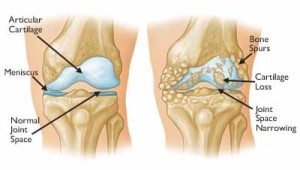Osteoarthritis is one of the most common musculoskeletal diseases worldwide impacting on the health of joints. The knee joint is commonly affected by osteoarthritis resulting in functional and social restrictions for an individual.
Knee osteoarthritis is characterised by degeneration of the articular cartilage that lies between the femur and tibia. This can cause changes to the underlying bone resulting in pain and impacting on joint function. Osteoarthritis of the knee typically presents with varying degrees of joint pain, swelling and impaired mobility.
The predominant risk factor for knee osteoarthritis is age, with a large increase in the occurrence of osteoarthritis after the age of 50 years. Repetitive microtrauma and macrotrauma to the knee can initiate the development of knee osteoarthritis as does excess body weight.
Knee osteoarthritis is diagnosed by having a detailed assessment that includes a discussion regarding the history of knee symptoms and a physical assessment of the knee. A plain X-ray may be requested, however due to inconsistencies radiographic findings must be correlated to the presenting symptoms.
There is no cure for the cartilage damage occurring in knee osteoarthritis, however treatment can reduce the symptoms experienced and attempt to slow the progression. Physiotherapy treatment is aimed at reducing painful symptoms and increasing the mobility and function of the knee. This may be achieved with multiple approaches, consisting of land based or water based exercises, manual therapy to the knee and surrounding structures and the use of medication. Lifestyle changes, such as modification to aggravating activities, may provide additional benefits. Surgery may be indicated for individuals with severe osteoarthritis, where symptoms have been unresponsive to the appropriate conservative treatment. This consists of knee replacement surgery and outcomes can be favourable with an experienced surgeon.
Physica physiotherapists will be able to assess and diagnose your knee pain and offer a wide range of services including supervised hydrotherapy sessions and Pilates classes. Your physiotherapist will be able to discuss these and other rehabilitation options with you.

